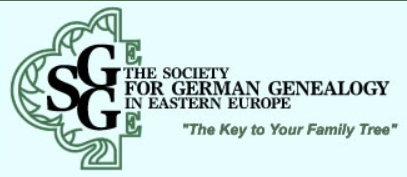Tip 15, Organizations and Genealogical Societies
Organizations Related to Galician Research
 . . |
The Hilfskomitee der Galiziendeutschen (Assistance Committee of the Galician Germans) was organized in 1946 and is an organization that promotes family research of the Germans in Galicia. (renamed to Die Galiziendeutschen - Geschichte und Erinnerungskultur e.V. in 2021 This website is in German but most of the main pages are also available in English. Their website has Publications, village plat maps ("Ortspläne") available to order, and the Village Family Books project (Digital copies of these familybooks are available for a fee from our website at this link). They publish two publications of particular interest to Germans from Galicia. The first is their monthly newsletter "Das heilige Band. - Der Galiziendeutsche" ("The Sacred Bond - The Galician Germans) and the second will be very familiar to users of this website as much material in our own publication and on our website has come from the "Zeitweiser" Yearbooks published for over 60 years! Both these publications are in German. While the Hilfskomitee der Galiziendeutschen primarily serves the interests of Germans in tracing their lineages back to Galicia, it welcomes members from all countries.
Some members have asked how they could donate funds to the Hilfskomitee. See this page for details. |
 |
The The Foundation for East European Family History Studies (FEEFHS)
was organized in 1992 as an umbrella organization that promotes family research in eastern and central Europe without any ethnic, religious, or social distinctions. It provides a forum for individuals and organizations focused on a single country or group of people to exchange information and be updated on developments in the field. While it primarily serves the interests of North Americans in tracing their lineages back to a European homeland, it welcomes members from all countries. Resource Guide Listings of Organizations Associated with FEEFHS (sorted by country) |
|
Bukovina Society of the Americas
This site is a goldmine of information about Bukovina which was the eastern most crown land of the Austrian Empire; now divided between Romania and Ukraine. Many Galician Germans in the extreme South-East of Galicia had branches of their family in Bukovina. Ethnographic Map of Bukovina in 1910. |
|
 |
Gesher Galicia |
 |
Wikipedia |
 |
Society for German Genealogy in Eastern Europe (SGGEE) : The SGGEE is devoted to the study of those people with German ancestry who lived in present-day Poland and also those people who lived in the western part of present-day Ukraine, in the old pre-World War II province of Volhynia. Auch vorhanden auf Deutsch.
|
|
East European Genealogical Society (EEGS): The EEGS "identifies and marshals genealogical resources for east European research". Galicia is one of the most popular regions in their mandated area of interest.
|
|
|
University of Alberta, Germanic Languages, Literatures, and Linguistics: This site has a single page on Galizien Germans which you can choose from the left-hand menu, and several other pages on the history and distribution of Germans in central Canada. |
|
|
Black Sea Germans: This website focuses on Germans who settled in Russia around the Black Sea and it has a large database of Germans who lived near the Black Sea at some point. It is helpful for those who have Galician German ancestors who either came from or went to Russia at some point before they immigrated to North America. Be aware that there are Russian villages with identical or similar names to Galician villages (eg. Kaiserdorf).
|
|
 |
Glückstal Colonies Research Association: GCRA is a non-profit organization researching family histories of the German colonists living in the Black Sea colonies of Glückstal, Neudorf, Bergdorf and Kassel. Again note that their village list has many entries similar to village names in Galician. |
 |
Genealogical Society of Małopolska: This website contains many online books and some maps about the part of Galicia that is currently in Poland, which often include information about all of Galacia. For example, this is the location of the indispensable "Das Kolonizationswerk Josefs II in Galizien". It has an English version, but many of the references are still in Polish or German. The use of Chrome/Edge or Google Translate is recommended. |
 |
The International German Genealogy Partnership’s mission is to facilitate German genealogy research globally as the internationally recognized federation of German genealogy organizations. They hold meetings at which information is shared among the various societies dealing in both English and German. GGD is a member of this partnerhship. |